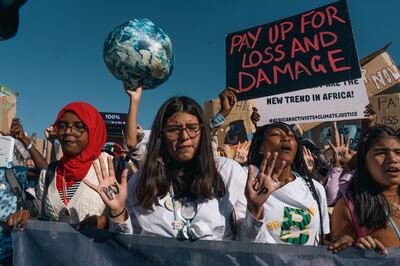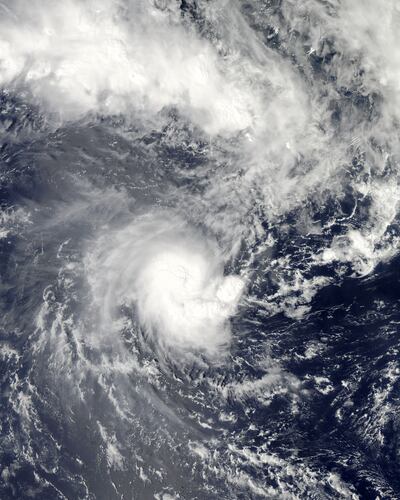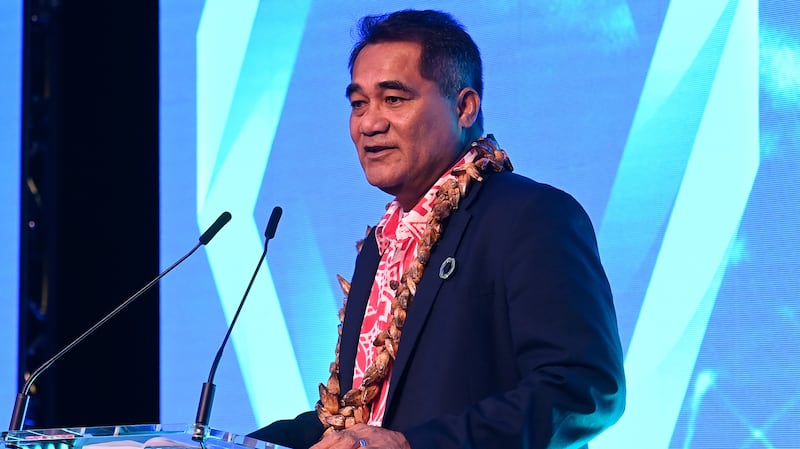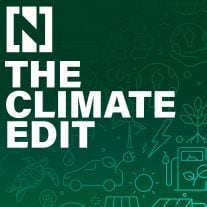Small island states have no way to hide from a climate crisis they have not caused yet one that still threatens their existence, a Samoan minister has said.
Toeolesulusulu Cedric Schuster, Samoa’s Minister of Natural Resources, Environment and Lands, said a host of events from rising seas to coastal erosion was hurting its people, with the country needing urgent support to tackle a crisis.
Speaking to The National, Mr Schuster said there was no alternative for Samoans but to stay optimistic at the Cop28 climate summit in Dubai that is now just weeks away.
“We are suffering damage already,” said Mr Schuster. “What will we tell our children and grandchildren?”
Relocating entire villages
Samoa is a country of about 200,000 people in the Pacific about midway between New Zealand and Hawaii. Most of the population live on the coast and are threatened by rising seas and coastal erosion from cyclones that have, according to the minister, eroded between 100 metres to 200 metres of the coast in some areas over the past two decades. Storms such as Cyclone Evan in 2012 and Cyclone Gita in 2018 caused widespread damage.
The Polynesian country has tried to tame the Pacific Ocean by building seawalls and has considered plans to move some buildings of its capital, Apia, inland if the situation deteriorates. More than 20 coastal villages have already had to relocate.
“How would you feel?” said Mr Schuster, when asked if the slow pace of global action angered him. “Yes, it does. We are looked on by our citizens as politicians and government officials to be able to help.
“They look at us and say: ‘why aren’t you doing anything?’ And [then we do not have] the resources to be able to help them.”
Mr Schuster is also the chair of the Alliance of Small Island States, or Aosis. The group was established in 1990 and has become a crucial bloc of 39 developing countries in the global climate negotiations. Small island developing states emit about 1 per cent of global greenhouse gas emissions but they are on the front lines of the crisis.
“We are suffering the most impact,” said Mr Schuster.

Small island states have been historic campaigners on climate issues. Vanuatu, for example, championed efforts to ask the International Court of Justice to issue an advisory opinion on the obligations of countries to tackle climate change. The UN General Assembly voted to make the request in March.
Aosis has also campaigned particularly on the issue of loss and damage. While Mr Schuster cautiously welcomed the agreement in Abu Dhabi last weekend that could lay the groundwork for a loss and damage fund to come into operation at Cop28, he said he didn’t want to see any single issue dominate the crucial talks.
Also vital, he said, was ensuring the 1.5°C goal was kept alive. “If we overshoot it, a lot of our states will be lost,” he said. “A lot of our population will be affected and a lot of our economies will be gone.”
Parties that signed the 2015 Paris deal agreed to “pursue efforts” to limit warming to 1.5°C on pre-industrial levels and Cop28 will assess how the world is measuring up through what it is described as a “global stocktake”. The UN has warned the world is way off track.
“The global stocktake needs to point us in the right direction … to ensure that we stay within 1.5°C and to finance that.”
Mr Schuster said it “looks like” the long-promised $100 billion annual pledge from wealthier to vulnerable countries would be finally delivered this year but the money required was “already way beyond that”. He also called for more focus at Cop28 on cutting emissions and scaling up adaptation, which means reducing vulnerability to climate change such as sea defences.
“If you look at any one country in Aosis, especially in the Pacific, it is not one event. Vanuatu has had three cyclones in one year.”

In Samoa, Mr Schuster painted a picture of a resilient community determined to continue its cherished way of life despite the challenges. The country is emerging from drought, with climate change also believed to be affecting the corals through bleaching and fisheries. This, in turn, affects the food supply and imperils food security.
“People are seeing the reality we have been talking about,” he said, referring to a year that has seen heat records smashed globally. “General populations are demanding that governments do something about it.”
Cop28 runs from November 30 to December 12 where leaders will gather to tackle the escalating climate crisis. Mr Schuster said he was coming to Dubai to “roll up his sleeves” to get a good outcome so he can return to Samoa and say: “We have done the best and this is what we are getting to help you.”
“We are resilient,” he said. “We have come through 3,000 years living on a small island. We will continue to be resilient. We’d like to work together with everyone else to make sure we continue to live in these places.”







